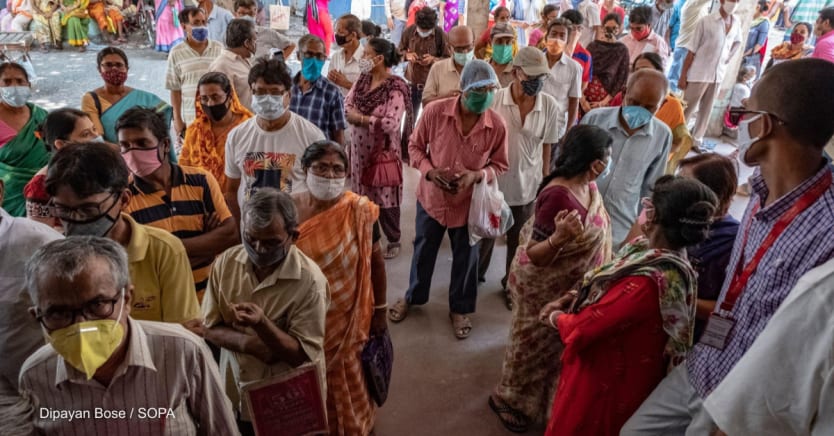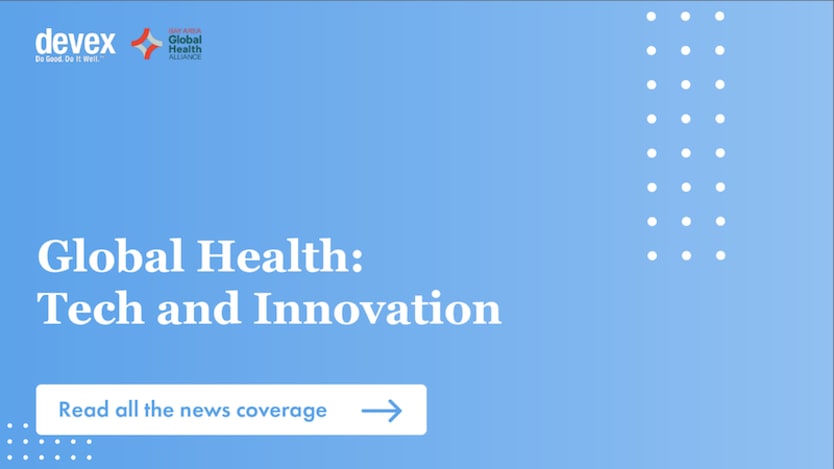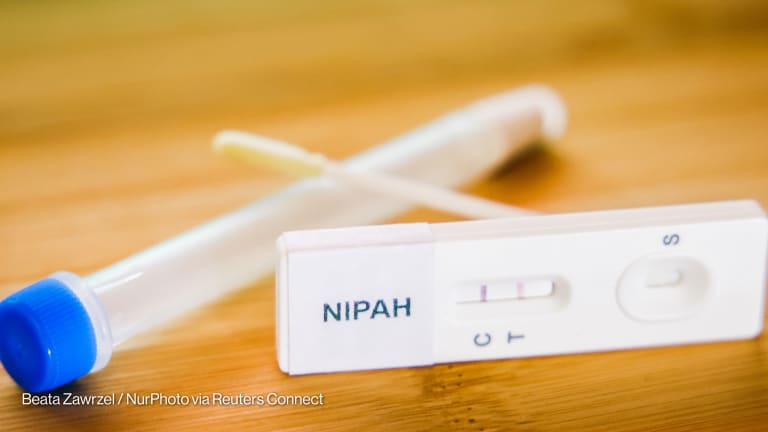Foreign aid regulations, donor fatigue stymie India COVID-19 response

For almost two weeks now, the Hemkunt Foundation based outside New Delhi has operated a 24/7 oxygen drive enabling COVID-19 patients to access oxygen cylinders, currently in short supply even in the city’s biggest hospitals. As the 11-year old organization expands its work to Mumbai and other cities, help is pouring in from all over the world — and yet, the foundation is not able to accept foreign donations.
As India’s COVID-19 outbreak stretches its health care system to the brink, NGOs working on the ground are struggling to receive funding from international donors, due to the country’s foreign aid regulations.
Sign up for Devex CheckUp
The must-read newsletter for exclusive global health news and insider insights.
NGOs wanting to receive foreign funding are required to have a license under the Foreign Contribution (Regulation) Act — but securing the license has also been mired in controversy over the last few years, leaving smaller NGOs such as Hemkunt Foundation most affected.
“This is slowing down the speed and agility of the response. A bigger organization such as Oxfam could help smaller NGOs on the ground but they can’t,” said Ingrid Srinath, director of the Centre for Social Impact and Philanthropy at Ashoka University. “The inability to re-grant funds is preventing collaboration which is desperately needed right now.”
New rules
The rules disallowing re-granting have been in place since September of last year, after the newly introduced FCRA Bill 2020 was implemented. The bill has been described by NGOs as a “death blow.”
In March 2020, after a strict lockdown was imposed in India, several NGOs came together to help migrant workers stuck on the roads as they were forced to return to their villages during the lockdown. “Last year, one of the most effective ways NGOS worked was through building a coalition,” Srinath said.
“Hundreds of international donors, businesses, and people from the diaspora are running around in circles and trying to help [but] everyone is being stymied.”
— Ingrid Srinath, director, Centre for Social Impact and Philanthropy at Ashoka UniversitySome of the FCRA provisions can be waived for a specific duration, and experts have argued that there is precedent for it as well. During the 2001 earthquake that hit the western state of Gujarat, the need for licences to get foreign funding was waived entirely. NGOs are now calling for a similar waiver.
In a meeting last week with India’s apex policy body, NITI Aayog, several NGO representatives demanded that the provision banning re-granting be waived as the COVID-19 crisis engulfs the country, Srinath said. While several media outlets reported on Thursday that the government is considering it, there has been no formal announcement yet.
“Hundreds of international donors, businesses, and people from the diaspora are running around in circles and trying to help,” Srinath said, but ”everybody is being stymied.”
Philanthropic funding
The donation platform GiveIndia has relaunched the pandemic response fund it opened last year — but even on the crowdsourcing platform, NGOs that don’t have an FCRA licence are not eligible to receive funding from foreign donors.
Vinod Khosla, the co-founder of Sun Microsystems, is directing his GiveIndia donations to lifesaving medical equipment, such as oxygen cylinders for Indian hospitals. He is among a growing number of high-net worth individuals and corporations coordinating grants through the platform. Other donors include Google and Microsoft.
GiveIndia is just one example of how philanthropic collaborations have emerged to support the COVID-19 response in India over the last year, said Pritha Venkatachalam, a partner at the Mumbai office of Bridgespan Group, a global consulting firm for NGOs, donors, and investors.
“There’s been a massive increase in collaborative work,” she said. “Funders are realizing they can’t do this alone.”
In addition to GiveIndia, there’s also the Action COVID-19 Team, or ACT Grants, a fund started last year by startup and venture capital leaders in India to provide grants and mentorship to startups working on COVID-19 solutions. ACT Grants is now working with Amazon, the Singapore-based Temasek Foundation, and the Pune Platform for COVID-19 Response to rapidly procure and airlift medical equipment.
These partnerships that have come together since the pandemic’s onset are now being leveraged in the second wave of COVID-19 cases.
“I don’t see the levels of energy that were there last year, because individuals are exhausted, and this wave has hit urban India and the urban elite far more.”
— Pritha Venkatachalam, Mumbai office-based partner, Bridgespan GroupBuilding nonprofits’ resiliency
Because many Indian funders do not fully fund NGOs’ costs, often NGOs do not have the flexibility they need in times of crisis and face major challenges in scaling the reach, effectiveness, and impact of their programs.
GiveIndia has evolved its model to support individual as well as institutional giving, rapidly mobilizing donations not just for emergency response, but also the recovery and resilience of Indian nonprofits. The platform has taken some of the recommendations for obtaining adequate funding outlined in new research by Bridgespan.
“Just funding programs is actually chronically underfunding nonprofits’ role and impact potential,” Venkatachalam said.
Funders can go beyond writing checks for NGOs program support by developing multi-year partnerships with them, funding indirect costs such as administrative costs, investing in organizational development, and supporting NGOs to build their financial reserves.
Venkatachalam said these best practices are more critical than ever in times of crisis.
Since the onset of COVID-19, Venkatachalam and her Bridgespan colleagues have produced a framework for domestic and international funders to support India’s response to the crisis. Bridgespan is updating those materials given the growing donor interest in recent weeks.
When funders don’t know which NGOs to support, they might turn to Prime Minister Narendra Modi’s PM CARES Fund, or other government relief funds. But Venkatachalam noted some challenges with this approach: Some NGOs are concerned the government-operated funds are redirecting critical resources from localized responses to centralized efforts.
“Those are not accountable as of yet,” she said of the funds. “[There is] no transparent information sharing on where they’re investing or how they will invest.”
Donor fatigue
In the early months of the pandemic last year, the philanthropic sector “really rose to the occasion,” Venkatachalam said. Philanthropists provided NGOs with the flexible funding they needed to support things such as vaccinations, vulnerable populations, and primary care.
But as the months wore on, donors started to wind down that funding to a smaller fraction of their portfolios and returned to their original mandates. Then coronavirus cases surged.
“I think it would be fair to say most of India was caught napping,” Venkatachalam said. “And I think the government and most other actors were probably in denial that this is going to be a second wave of this. Everyone was underplaying it.”
More on COVID-19 funding:
► Malawi audit confirms extensive mismanagement of COVID-19 funds
► Global Fund's $5B ask for COVID-19 response still lacking funds
► In Brief: A breakdown of global funding in the US COVID-19 bill
Now, as the crisis ramps back up, donors have new options — such as GiveIndia and ACT Grants. But Venkatachalam said she is concerned about donor fatigue. “I don’t see the levels of energy that were there last year, because individuals are exhausted, and this wave has hit urban India and the urban elite far more,” she said.
With COVID-19 hitting the headquarters of these foundations and nonprofits, affecting staff and family members of people employed there, those who have mobilized funds over the course of the pandemic are extremely stretched, Venkatachalam explained. “It’s going to take a much bigger push,” she said. “Last year, it was both a push and a pull. People opened their pursestrings up to very high levels of generosity.”
At the same time, India’s outbreak should serve as a wake up call for the philanthropic sector to invest in health systems. “If we just see this as a passing cloud again and don’t invest in health systems, India’s just going to be far poorer on multiple grounds,” Venkatachalam said.
This coverage, presented by the Bay Area Global Health Alliance, explores the intersection between technology, innovation, and health. How are tech, innovation, and cross-sector partnerships being leveraged to accelerate equitable access to health care?

Search for articles
Most Read
- 1
- 2
- 3
- 4
- 5









